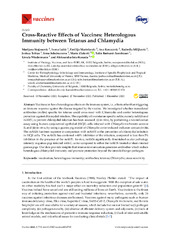| dc.creator | Stojanović, Marijana | |
| dc.creator | Lukić, Ivana | |
| dc.creator | Marinković, Emilija | |
| dc.creator | Kovačević, Ana | |
| dc.creator | Miljković, Radmila | |
| dc.creator | Tobias, Joshua | |
| dc.creator | Schabussova, Irma | |
| dc.creator | Zlatović, Mario | |
| dc.creator | Barisani-Asenbauer, Talin | |
| dc.creator | Wiedermann, Ursula | |
| dc.creator | Inić-Kanada, Aleksandra | |
| dc.date.accessioned | 2021-02-18T10:52:49Z | |
| dc.date.available | 2021-02-18T10:52:49Z | |
| dc.date.issued | 2020 | |
| dc.identifier.issn | 2076-393X | |
| dc.identifier.uri | http://intor.torlakinstitut.com/handle/123456789/552 | |
| dc.description.abstract | Vaccines can have heterologous effects on the immune system, i.e., effects other than triggering an immune response against the disease targeted by the vaccine. We investigated whether monoclonal antibodies (mAbs) specific for tetanus could cross-react with Chlamydia and confer heterologous protection against chlamydial infection. The capability of two tetanus-specific mAbs, namely mAb26 and mAb51, to prevent chlamydial infection has been assessed: (i) in vitro, by performing a neutralization assay using human conjunctival epithelial (HCjE) cells infected with Chlamydia trachomatis serovar B, and (ii) in vivo, by using a guinea pig model of Chlamydia caviae-induced inclusion conjunctivitis. The mAb26 has been superior in comparison with mAb51 in the prevention of chlamydial infection in HCjE cells. The mAb26 has conferred approximate to 40% inhibition of the infection, compared to less than 5% inhibition in the presence of the mAb51. In vivo, mAb26 significantly diminished ocular pathology intensity in guinea pigs infected with C. caviae compared to either the mAb51-treated or sham-treated guinea pigs. Our data provide insights that tetanus immunization generates antibodies which induce heterologous chlamydial immunity and promote protection beyond the intended target pathogen. | en |
| dc.publisher | MDPI, Basel | |
| dc.relation | Institute for Specific Prophylaxis and Tropical Medicine, Medical University of Vienna, Austria | |
| dc.relation | Laura Bassi Centers of Expertise (FFG) [822768] - Austrian Research Promotion Agency | |
| dc.relation | info:eu-repo/grantAgreement/MESTD/inst-2020/200177/RS// | |
| dc.relation | info:eu-repo/grantAgreement/MESTD/inst-2020/200168/RS// | |
| dc.relation.isreferencedby | https://hdl.handle.net/21.15107/rcub_intor_643 | |
| dc.relation.isreferencedby | https://doi.org/10.3390/vaccines8040719 | |
| dc.rights | openAccess | |
| dc.source | Vaccines | |
| dc.subject | vaccination | en |
| dc.subject | heterologous immunity | en |
| dc.subject | antibodies | en |
| dc.subject | tetanus | en |
| dc.subject | Chlamydia | en |
| dc.subject | cross-reactivity | en |
| dc.title | Cross-Reactive Effects of Vaccines: Heterologous Immunity between Tetanus and Chlamydia | en |
| dc.type | article | |
| dc.rights.license | ARR | |
| dc.citation.issue | 4 | |
| dc.citation.other | 8(4): 719 | |
| dc.citation.rank | M21 | |
| dc.citation.spage | 719 | |
| dc.citation.volume | 8 | |
| dc.description.other | Supplementary information: [https://hdl.handle.net/21.15107/rcub_intor_643] | |
| dc.identifier.doi | 10.3390/vaccines8040719 | |
| dc.identifier.fulltext | http://intor.torlakinstitut.com/bitstream/id/365/549.pdf | |
| dc.identifier.pmid | 33271962 | |
| dc.identifier.scopus | 2-s2.0-85097255732 | |
| dc.identifier.wos | 000601709900001 | |
| dc.type.version | publishedVersion | |

